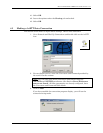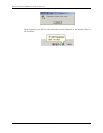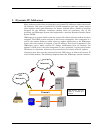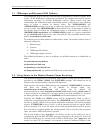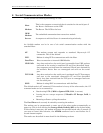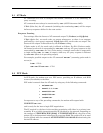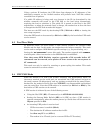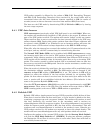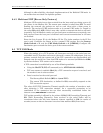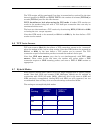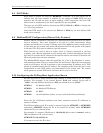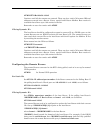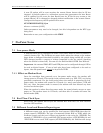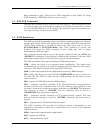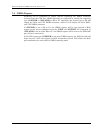
Raven and PinPoint CDMA User Guide Version 1.12
AirLink Communications, Inc. Page 31 March 24, 2004
UDP packet assembly is affected by the values of S50 (PAD Forwarding Timeout)
and S51 (PAD Forwarding Character). Data received in the serial buffer will be
transmitted when the idle inter-character timeout specified in S50 (in tenths of
seconds) occurs or when a character is received that matches S51 (if non-zero).
The host can exit UDP mode by deactivating DTR (if S211=0 or &D2) or by issuing
the +++ escape sequence.
6.4.1 UDP Auto Answer
UDP auto answer (previously called UDP half-open) is set with S82=2. When set,
the modem will automatically establish a UDP session to the source IP address and
port of the UDP packet received. The modem will remain “locked” to this one remote
IP/port until no data is sent or received for the time interval defined in the UDP auto
answer timeout (S83). During this session, packets from other IP/port addresses will
be rejected, unless *UALL is set. Whether or not an incoming packet will cause the
modem to enter a UDP session is always dependent on the S53 and AIP settings.
When idle, after the timeout has occurred, the modem is in AT command mode on the
serial port, and any valid AT command may be entered during this time.
The Normal UDP Mode (MD3) can be combined with UDP auto answer to cause
the incoming serial data to be sent in UDP packets (instead of being treated as AT
commands), while allowing sessions to be established from different UDP sources. A
UDP session will be initiated either by incoming serial data or by an incoming UDP
packet. The session, started by either method, will be terminated when no data has
been sent or received for the S82 period. Once the session terminates, another may
be initiated by either means.
When the session is initiated by serial data, the new session will be established using
the destination address specified in S53. The S53 setting can be changed if the
connect to last UDP setting (*UDPLAST=1) is set. The address in S53 will be
updated to reflect the address of the last session initiated by an incoming UDP
packet. So that when new data is received over the host serial port while in the idle
state, a session will be re-established with the last address. (This behavior is the
same as the previous Hybrid2 (MD6) mode).
Note that TCP auto answer (S0=[1|2]) may also be set simultaneously with UDP
auto answer. Then, when in the idle state, the modem will accept either a TCP or
UDP incoming packet, and enter a TCP or UDP session as appropriate.
6.4.2 Reliable UDP
Reliable UDP adds a simple protocol on top of UDP to provide reliable deliver of data.
When data is received from the host serial port, a 2 byte header is added to the data,
containing a message type and a sequence number. The modem will continue to send
this data (buffering any received data in the meantime) until it receives an
acknowledgement with this sequence number. If an acknowledgement is not received
within the timeout period (specified in S7), the data will be retransmitted. This will
continue until an acknowledgement is received or the modem is reset. Likewise any
UDP packets received by the modem are expected to have this simple header. The
modem will issue an acknowledgement for any valid packets which are received.
Configure the modem as for a normal UDP session. Set the Startup Mode Default
to 3, and the UDP Mode Default to 7 [ATMD73]. If using two modems, configure
the Destination IP and Port in each to point to each other. Serial data will then be
sent reliably between the two



